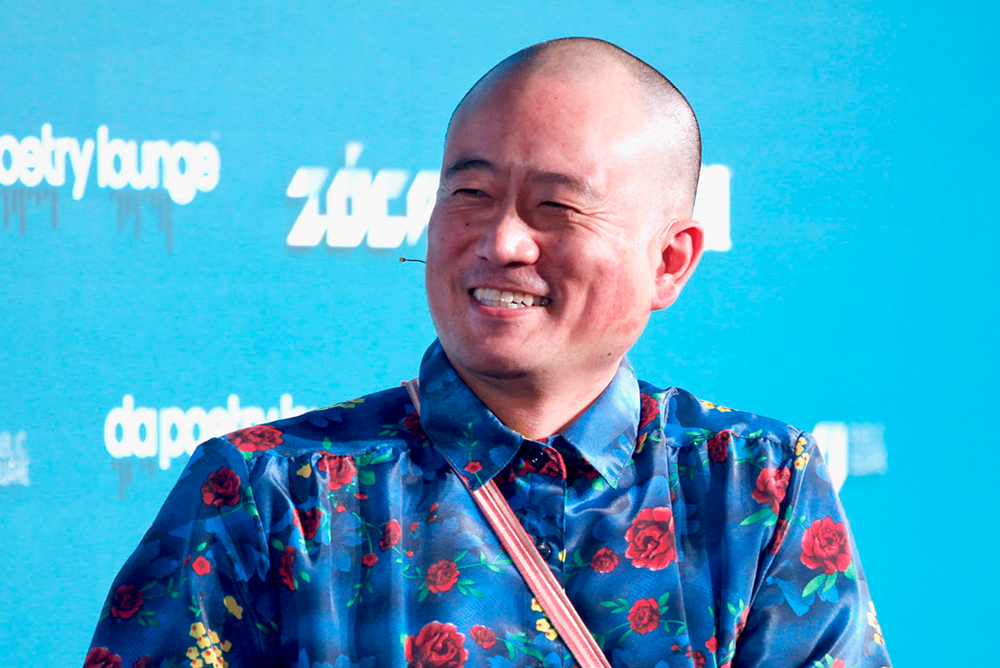
Photo by Aaron Salcido.
Beau Sia is a Tony-award-winning slam poet. Before he took part in this week’s Zócalo/Da
Poetry Lounge spoken word performance and conversation, “Does Democracy Need Poets?,” at ASU California Center in downtown Los Angeles, Sia spoke about his writing practice, doing Qigong every morning, and being on Broadway.
When did you start writing poetry?
I started writing poetry when I was 15. The first time I’d seen poetry performed in the form called spoken word was on this show called MTV Spoken Word Unplugged. They did a half hour of all the great New York poets of the era, including Henry Rollins and other musicians like John S. Hall. When I saw that, it made me want to move to New York.
Is there something else you miss about MTV?
I miss when music videos pushed the boundaries of the three-minute format. There was an era where it was very inventive, because that structure was very new. As a teenager, it began with a-ha’s “Take On Me,” and later R.E.M.’s “Losing My Religion”—a groundbreaking design. And there’s even a point where it gets grittier. Beck had this song called “Loser” that ushered in this era of the gritty style.
You have a book of poetry called A Night Without Armor II: The Revenge. What is one piece of armor you wear on a daily basis?
I’ll give you two: If I got to go out in public, I’ll generally wear a jacket, like a trench coat. I also do Qigong every morning. In many ways that grounds me and gets my energy in a manner that I feel safer in the world.
How has poetry inspired you to action?
For me, living the life of a poet brought me into all these worlds and realities of people that, growing up in Oklahoma, I would never have otherwise known what they go through, what their life is like, how the world treats them. I tell people that one of the greatest things of being in Def Poetry Jam on Broadway wasn’t being on Broadway but being with nine poets from Americas—parts of America—that I didn’t understand that voice, and they really resonated with that voice. It showed me how all of us are striving for the same thing but we all come with different voices to share that. That was amazing. It’s such a gift to not just observe people through a screen but to be a part of their lives. That can really change you. And it inspired me to get involved in struggles that I would not have.
When the zombie apocalypse arrives, what poet would you want by your side?
Me. I’m the guy. I’m a lottery draft pick for any apocalypse team.
What are some of your writing strategies or habits?
These days I make sure I start my morning not reacting to the world but engaging with where I’m at. So I have a writing practice in the first hour or two of the day that puts me in that frame of mind before I interact with the world. And I make sure to be very committed to that. The world can really drag you into a place that’s not for you right now, on any day.
What is something you enjoy about teaching or mentorship?
As a performer, you can get people inspired. But when you teach, when you mentor, you have an opportunity to not only heal from your own failures but an opportunity to make somebody’s road a little bit less hard, and empower them in ways you may never experience.
Who is somebody that inspires you?
One of my sisters really inspires me. Growing up chasing what America wanted me to be—or what I believed America wanted me to be—I didn’t see her gifts and I didn’t see who she was as a person. And as we’ve grown into our adulthood and developed our relationship, she really inspires me to develop my character. I’ve had a lot of great creative skills, but that doesn’t necessarily mean I had great character.



